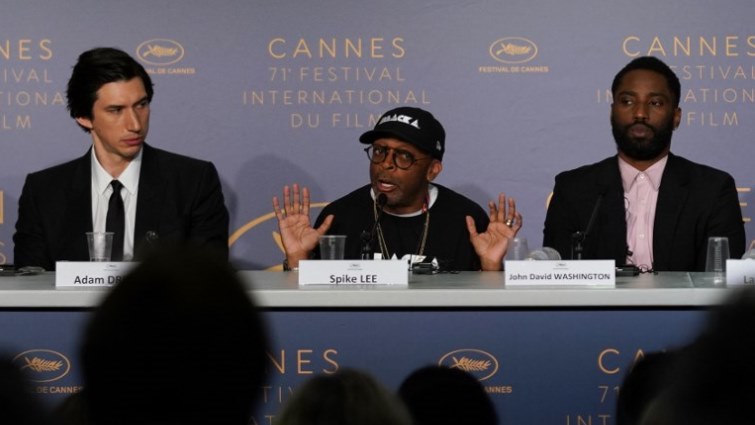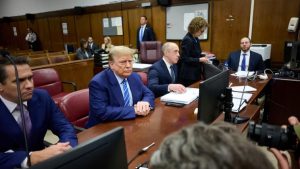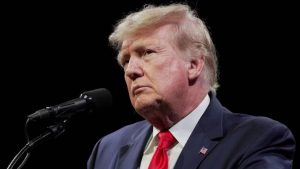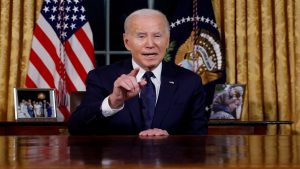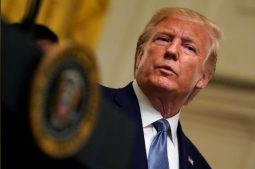Spike Lee launched a searing broadside at Donald Trump Tuesday after premiering his new movie “BlacKkKlansman”, an indictment of “global” white nationalism, to a standing ovation in Cannes.
Shaking with rage, Lee said Trump’s refusal to condemn the deadly far-right protests in Charlottesville last August would be his “defining moment” as US president.
“That motherfucker was given a chance to say we are about love and not hate and that motherfucker did not denounce the motherfucking Klan, the alt-right and those Nazi motherfuckers,” he told a news conference after the film screened at the world’s top film festival.
Lee, 61, tells the extraordinary true story of Ron Stallworth, the first African-American on the Colorado Springs police force who managed to infiltrate the highest levels of the Ku Klux Klan in the 1970s.
The cop, played by John David Washington, son of two-time Oscar winner Denzel Washington, conducts much of the investigation on the phone and enlists the help of a white Jewish officer (Adam Driver) when it is time to meet the Klansmen face-to-face.
The final scene includes chilling footage of last August’s white nationalist march in Charlottesville, Virginia in which a counter-demonstrator, 32-year-old Heather Heyer, was killed and several others injured. Trump is later seen on camera blaming “both sides” for the bloodshed.
Lee dedicates the picture to Heyer’s memory — “Rest in power” — and will release the film on the first anniversary of the Charlottesville protests.
“This film to me is a wake-up call. We’ve gone for the okey-doke, walking around in a daze and stuff is happening and it’s topsy-turvy and fake has been trumpeted as the truth,” Lee said.
“I know in my heart — I don’t care what the critics say — we are on the right side of history with this film.”
In the movie, former KKK Grand Wizard David Duke (Topher Grace) leads “America First” chants and even dreams of putting a white supremacist in the White House one day.
Driver, who is also presenting “Solo: A Star Wars Story” at Cannes, said dressing up in a KKK robe and pointed hood with holes for the eyes “doesn’t really feel good”.
“It’s strange but then you have to get through your shooting day,” he told a small group of journalists.
“It was like ‘did they get this in a (shopping) catalogue?’ There had to have been somebody somewhere stitching and being like ‘It’s not quite right, this eyehole’s a little lower’. As if organised hate needed any more absurdity.”
Washington, a former professional football player, said he was keen to examine how African-American officers may feel conflicted about police work given racial tensions.
“I came into this story with great surprise,” he said, “but also more admiration for the men and women of colour that serve their community wearing the badge, and how we haven’t heard more of their stories and how they feel about the political climate then and now.”
Early reviews of the film were overwhelmingly positive, saying that what it lacks in subtlety it makes up for with righteous fury and a fitting sense of the ridiculous.
“Lee’s latest is as much a compelling black empowerment story as it is an electrifying commentary on the problems of African-American representation across more than a century of cinema,” Variety said.
London’s Guardian said the movie “responds fiercely, contemptuously to the crassness at the heart of the Trump regime and gleefully pays it back in its own coin”.
“BlacKkKlansman” marks Lee’s first outing in the official competition at Cannes since 1991’s “Jungle Fever”. The director said the new film’s themes are far from restricted to the US.
“This rise of the right-wing is a global thing,” he said later, mentioning extremist parties in Europe and the hostile response to refugees in some countries.
“To me this film is an answer to that, to people being in a trance. We don’t know what’s up or down or right or wrong.”
At the premiere, he basked in a six-minute-long standing ovation and flashed the “Love” and “Hate” knuckle-dusters worn by Radio Raheem in his 1989 hit “Do the Right Thing” at the cameras.
“When Trump could speak on the side of truth and not hate, he chose hate,” he said.
“When he didn’t denounce, (white supremacists) were like ‘Hee-haw, that’s our guy! He has our back.’ It was a green light.”


